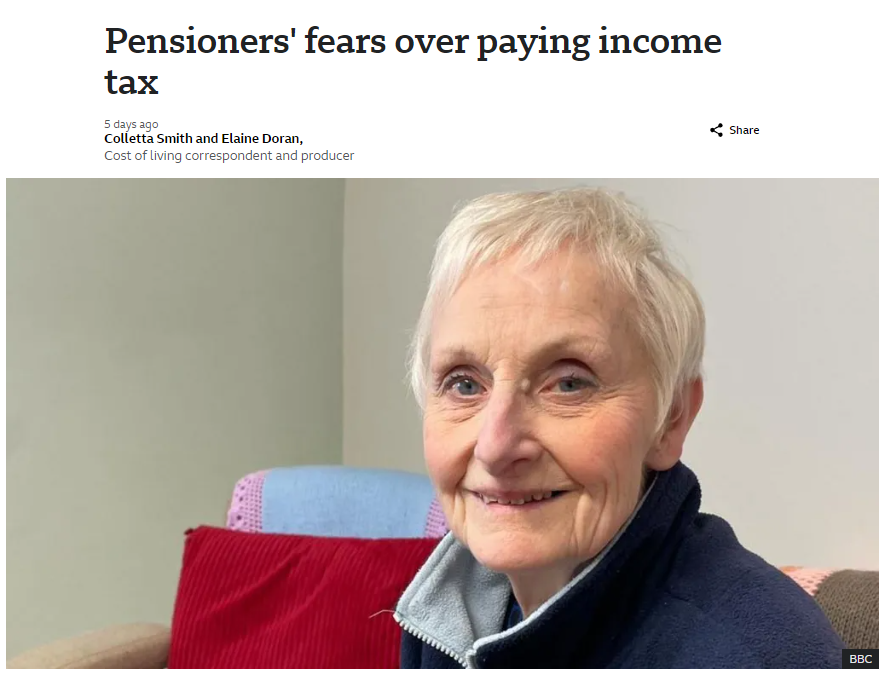According to the BBC, charities are reporting that seniors are more afraid of being forced to pay income tax. Early in April, the state pension increased by 8.5 percent; however, this had the unintended consequence of forcing hundreds of thousands of retirees with lesser incomes to pay income tax. Because tax thresholds have been frozen, the majority of retirees will pay higher tax this year.
Both Age UK and Independent Age report a rise in calls to their helplines from elderly people who are unsure about the situation in recent weeks.
Who will pay more tax? Nothing should change for a British pensioner if the state pension is the only source of income. The maximum state pension for an individual has been raised to £11,500, which is still less than the £12,570 mark at which income tax is withheld. Since additional Pension Credit payments are tax-free, they are not deducted from one’s personal income allowance before taxes are due.
BBC then cites what 90-year-old Audrey Cook, a pensioner who lives in Bromborough and who lives off her state pension and knows that another increase next year could tip her over into the category of having to pay income tax, told it:
“It feels like a double-tax,” the 90-year-old said. “We paid tax when we worked, we didn’t get big salaries, and now we’re paying on our little bit of pension which is not a lot. And with the cost of living you can’t keep paying extra all the time. The tax threshold should increase.”
Eighty percent of retirees receive additional income in addition to their state pension, either from employment or from a private or workplace pension. Since the majority of those in this category will make more than £12,570 in total income, it is likely that they will need to pay income tax.
A PAYE number is used to automatically tax a private pension or pay at the source. This implies that taxes are deducted even before funds enter a bank account.
The tax rate should only be 20% on anything that raises total income above £12,570, thus tax codes should be verified to ensure that the correct rate is being paid.
Pam Carrington is a craft class instructor at Age UK on the Wirral, and she has already noticed a difference. In addition to her own state and private pensions, she receives a little private pension from her late spouse.
“They’ve taken £2 out of it,” she said. “I used to get £7 a month and now I just get £5 a month from that pension.”
Saritha Rao, her friend, concurred that even a minor decrease may have an impact. “Every copper counts. I try to stretch the budget as far as I can but there’s only so far you can stretch before you break,” she said.
According to Independent Age CEO Joanna Elson, “For older people on a low income who are facing a daily struggle to make ends meet, any potential reduction in income is incredibly worrying. Many of the people calling are confused about what tax they will have to pay, and many who are already living on a low income are worried about being worse off because they now have to pay tax.”
Another charity, Age UK, said it had also received more calls about frozen tax thresholds. Sally West, a policy manager at the charity, said the benefit of recent National Insurance cuts did not apply to pensioners because they did not pay it.
HM Revenue and Customs (HMRC) states that earnings over the personal allowance from other sources, such as rental income as a landlord, should be disclosed using self-assessment forms as normal.
This fiscal year, a larger bill should be anticipated because the state pension rise will have increased overall income, but the method for paying that tax will stay the same. Individuals who receive additional income, such as interest from investments or savings accounts that are not subject to PAYE taxation, might not have previously completed a self-assessment form.
According to HMRC, there was no requirement to finish a self-evaluation. Rather, they would receive a Simple Assessment—basically, a bill for the taxes owed—at the conclusion of the tax year.
It would come in July of next year, and payment is due by January of the following year. While the likelihood of a senior falling into this group is extremely low, Clare Merrills from HMRC acknowledged that it can be unsettling to have an unidentified amount hanging over your head.
“They really don’t need to worry,” she said. “If there is any tax due we will contact them directly in maybe the June or July after the end of the tax year explaining exactly what they need to do.”
HMRC added that individuals could get in touch with advisors, particularly if they would find it difficult to make ends meet, as the funds could be collected in smaller installments.
According to a Treasury spokesperson who spoke to the BBC, “Pensioners do not pay any income tax if their sole income is from the full new state pension, and we are standing by our commitment to maintain the Triple Lock by raising the basic state pension to almost £170 a week, after the largest ever cash increase last year. As the Resolution Foundation has said, the introduction of the Triple Lock and New State Pension means pensioners are on average £1,000 better off than if the state pension had just risen with earnings.”
Because if you earn it, they tax it and when you die, they death tax you.

